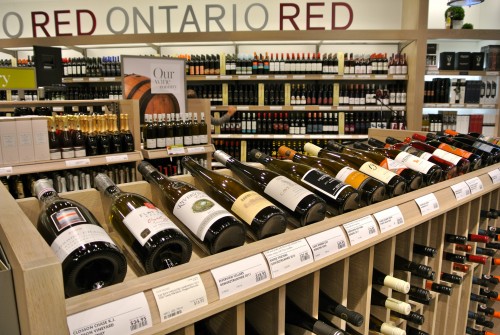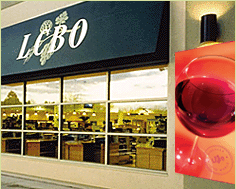 Anyone else alarmed by the comments made by the boss of the Winery and Grower Alliance of Ontario, which represents, according to them, 85% of all Ontario wines that are produced and sold in Ontario?
Anyone else alarmed by the comments made by the boss of the Winery and Grower Alliance of Ontario, which represents, according to them, 85% of all Ontario wines that are produced and sold in Ontario?
In case you missed it, in the midst of all the positive reaction to a C.D. Howe report that makes it clear that the privatization of wine, beer and spirits in this province would not only put more money into government coffers but would also create more choice and better prices available for consumers, Patrick Gedge told the St. Cathaines Standard that his association stands firmly behind the LCBO monopoly.
We should be concerned by that, very concerned.
Gedge, president and CEO of WGAO, heads up a big list of wineries, which have chosen to throw in with the alliance as opposed to the Wine Council of Ontario. They are:
Andrew Peller Limited, Bricklayer’s Predicament, Chateau des Charmes, Colio Estate Wines, Constellation Brands, Cooper’s Hawk Vineyards, Crush, Dan Aykroyd Wines, De Sousa Wines, Diamond Estates Wines & Spirits, EastDell Estates, Fresh Wines, G. Marquis, Girls Night Out, Hillebrand Showcase, Inniskillin Wines, Jackson-Triggs Niagara Estate Winery, John Howard Cellars of Distinction, Kittling Ridge, Lake & River, Lakeview Cellars, Le Clos Jordanne, Magnotta Winery, Mastronardi Estate Winery, Megalomaniac, Milan Wineries, NHL Alumni Wines (Hat Trick), Niagara College Teaching Winery, Peller Estates, Seasons De Sousa Wine Cellars, Small Talk Vineyards, Stonechurch Vineyards, Thirty Bench Wine Makers, Trius, 20 Bees Wines, Two Sisters Vineyards, Vinoteca Inc. Premium Winery, Wayne Gretzky Estates No.99.
 Those members represent over 85% of all Ontario wines that are produced and sold in Ontario including the wines that no one really wants to talk about: Those so-called International Canadian Blends (ICB) that are not really Ontario wines at all, but blended with a small portion of Ontario grapes with juice from God knows where, and crowding the shelves at the LCBO and confusing consumers for decades.
Those members represent over 85% of all Ontario wines that are produced and sold in Ontario including the wines that no one really wants to talk about: Those so-called International Canadian Blends (ICB) that are not really Ontario wines at all, but blended with a small portion of Ontario grapes with juice from God knows where, and crowding the shelves at the LCBO and confusing consumers for decades.
Gedge, pictured above, said between the LCBO’s 640 stores and the agency stores, it’s difficult to identify where there would be under-serviced areas in the province that wouldn’t cannibalize existing sales.
“Why invest the energy and the dollars and the risk of setting up small networks that cannibalize what exists today when you can focus your energy on leveraging a pretty massive network that is there?” he told the newspaper.
The stance of WGAO is that the best way to increase sales of Ontario wine and grapes is to leverage that LCBO distribution network, he maintains.
Gedge says the challenge for Ontario wineries, all Ontario wineries, is to take on imports, not each other. He said at the LCBO 70% of sales are imports and 30% Ontario (he lumps ICB with those numbers).
Gedge, who has no background whatsoever in the wine industry other than his stint at WGAO , told the Standard that “our goal is to, quite frankly, convert imported wine drinkers who have 70% of the marketplace and bring them over to Ontario wine. If we can work at converting those people, (there will) be enough business for all of the wineries,” he said.
Gedge, as a parting note, laid this zinger on the Standard: He’s never seen a business case that can objectively quantify that private systems would have significant benefits to the industry.
That’s a howler, of course, and it’s quite likely that Gedge knows that (at least I truly hope he does). He’s a smart man with an envious resume outside of the wine business. But he’s paid to protect his alliance interests, and those interests just happen to be the sea of ICB swill that has no other place to go but the LCBO and, here’s the kicker, those “private” stores that are all owned by WGAO members because of some archaic rule that allows licences that existed pre-NAFTA to carry on seemingly until the end of time.
 It is obvious that Gedge doesn’t get out much to see what competition looks like in most of the world beyond the borders of Ontario.
It is obvious that Gedge doesn’t get out much to see what competition looks like in most of the world beyond the borders of Ontario.
While monopolies have crumbled throughout the free world, the LCBO hangs of for dear life, partially because of reasoning spouted by the likes of WGAO .
Competition, Mr. Gedge, is what makes the world go around. It fosters healthy businesses to flourish, and unhealthy ones to fold; it challenges businesses to do better; it creates competitive pricing; it creates added choice; it puts everyone on an even playing field.
I don’t know how Gedge can dismiss the findings of the C.D. Howe report that concludes Ontario would rake in more money from alcohol sales, consumers would pay less for booze and have greater choice of products if the Ontario government opened up booze sales to the private sector.
The study says that Ontario is actually losing revenue by holding a virtual monopoly on the sale of booze.
The report, written by two economists, points to the Western provinces that have more competition and have 7% more per capita in provincial alcohol profits than those with government-run monopolies.
The study concludes that it is in the best interests of the Ontario government to allow wine and beer sales in grocery and convenience stores, permit beer to be sold by other retail outlets and grant licences for off-winery stores to wineries and to new wine retailers.
“These changes would increase the choices available and reduce prices for Ontario consumers, as well as improve the competitiveness of Ontario’s smaller wineries and breweries and generate more revenue for the government,” the report said, according the Canadian Press.
 Ontario, and this is important for you to understand, Patrick Gedge, is the only jurisdiction in North America that limits off-site liquor sales to a chain of government stores, a single private beer retailer and a fixed number of off-winery wine stores, the report said.
Ontario, and this is important for you to understand, Patrick Gedge, is the only jurisdiction in North America that limits off-site liquor sales to a chain of government stores, a single private beer retailer and a fixed number of off-winery wine stores, the report said.
I believe most consumers agree with the stance taken by the rest of Ontario wineries (not one of them making blended wines) represented the Ontario Wine Council.
The wine council says the institute’s call for major change in Ontario’s alcohol retailing system agrees with its position that lack of competition is resulting in less choice for consumers and reduced government revenues.
 The WCO says it has developed a model, based on substantial research, for the introduction of private wines shops in Ontario, which would operate parallel to the LCBO. The “Pairs Perfectly” proposal, outlined here, addresses all of the concerns raised in the Howe report with respect to consumer choice and maximizing government revenue to support priority public services.
The WCO says it has developed a model, based on substantial research, for the introduction of private wines shops in Ontario, which would operate parallel to the LCBO. The “Pairs Perfectly” proposal, outlined here, addresses all of the concerns raised in the Howe report with respect to consumer choice and maximizing government revenue to support priority public services.
“The C.D. Howe Institute is on the same page as the Wine Council of Ontario, in calling for greater choice and convenience for consumers. Our model offers the best solution for change in a way that delivers a win for all concerned — consumers, the LCBO and government — in a socially responsible manner,” said Allan Schmidt, chair of WCO.
The “Pairs Perfectly” model envisions a network of privately operated wine shops across the province which would be retail customers of the LCBO’s wholesale distribution arm, similar to the beverage alcohol system in British Columbia.
“We will continue to urge the Ontario government to work with us to modernize and improve retail opportunities for Ontarians to better be able to enjoy the products of our province’s outstanding wine regions,” Schmidt said.
“Consumers have been clear with us. They want change in the way wine is sold in Ontario, but they want to see it done in a way that is complementary to the LCBO and we agree. Ontarians deserve the opportunity to have additional selection and the kind of shopping experiences that residents of other provinces enjoy.”
And that, Mr. Gedge, is how you grow the Ontario wine industry. Not by throwing in with a dinosaur monopoly in dire need of change.
It is quite clear your comments and position are solely guided by your members’ desire to protect the ICB brands and hundreds of “private” retail stores they own, but, come on, the industry in Ontario needs one voice in this fight.
And yours, quite seriously, is downright scary.






Hi Rick,
Great post overall. Some small issues I want t point out.
1. You seem to lump liberalization of retail and privatisation of the LCBO. These are different things. We can certainly expect that liberalization (i.e., private wine stores and more off site retail), like what WCO recommends to be a net positive. And this can be done without privatisation of the LCBO, which would be problematic because it would result in a private monopoly (kind of like a Walmart) which is not necessarily better than a public one.
2. Contrary to the CD Howe report, Ontario is not the only place in North America with a government run alcohol retail monopoly. Pennsylvania has the same thing, called Pennsylvania Wine and Spirits. It sells everything beside beer, which is sold by a private beer retailers.
3. The reason we have higher prices in Ontario is not just because of the retail structure but because of the supposed social responsibility driven minimum pricing requirement, which is most obvious in the beer segment and was introduced as a gift to the big beer obey. Unless that is gotten rid off, prices will not go down.
4. The credentials of the CD Howe economists who wrote the report are weak. One of them is a guy who writes commissioned reports that for the right amount of money will prove anything you like to prove. He has not published in reputable journals (a key mark of research quality) but has been used as a tool by the convenience store association to push for their agenda. Incidentally looking at convenience stores in the US, you can clearly see that they are no supporters of craft industries. So if we let them sell alcohol here, expect to see plenty of foreign plonk and CIB junk. WCO’s idea of private wine stores side by side with LCBO is much better.
My point is that you are right overall, but that there are problems with the report that we should not overlook. That is why WCO smartly picked and chose which aspects of the report to side with and which ones to ignore. There is too much extreme rhetoric on both sides of the debate that is not helpful. So it is nice to see WCO taking a more balanced approach.
Maxim, thanks, great comments. Yes, I do mean either partial privatization (as is what is occurring in B.C.) or the eventual privatization of booze retailing, such as they have in Alberta. My belief and hope would be that partial privatization would one day lead to total privatization as the monopoly stops building mega-stores and sheds its appetite for bricks and mortar. On your second point, that Ontario is the only jurisdiction in North America that limits off-site liquor sales to a chain of government stores, a single private beer retailer and a fixed number of off-winery wine stores, I think is correct in the way it’s worded. That is slightly different than Pennsylvania where beer is sold privately (The Beer Store is owned by big beer companies and is essentially a monopoly).
Nice article. The LCBO monopoly and the alcohol controlled in Ontario is a taboo subject.
Probably Ontario and North Korea are the only ones who hold this kind of monopoly.
First of all, beer and wine industry should be considered part of food industry not alcohol industry. Like most of the European Countries. That was the first reason to implement HACCP-food safety in beer /wine industry and , in most of the European countries food safety is mandatory in wine/beer industry (you can’t run the winery if you don’t do food safety certification – the inspectors comes and shut down your facility).
By considering beer/wine industry part of food industry, the alcohol taxes should be lower or even equal to zero.
Second, by privatizing the Ontario Wine industry , will create more jobs, bringing more taxes by increasing sales (if still be taxes on wine) and consumers will have more choices. There are LCBO’s stores up North where you can’t find any Niagara Region Wines , you’ll find only local wines (usually fruit wines), import wines and ICB wines.
If the consumers from that area wants to drink Niagara wines , they need to go there, visit the Niagara wineries and buy some wine. In a free country like Canada this is kind of unusual.
3rd, should be a better control in wine industry by a government agency. LCBO is doing audits to wineries for the purpose of taxation and sales. How the wine is made, what quality is, this is controlled only by VQA.
To my opinion, VQA it is a joke, it is an Alliance with board members from wine industry (most of the 85% big wineries ) who take decisions based on the big wineries interest. There are few members (to my opinion only puppets) just to shut the mouth of grape growers and small-medium size wineries.
VQA Board members are all the time in conflict of interests. The way VQA control the grape growing, or the way GGO control the grape growing/vineyards/ fields it is a big joke here in Ontario. GGO just regulate the grape prices and what farmers declare at harvest. But, nobody check the quality of grapes, viticulture practices, yield (tons/acre), winemaking practices. This is the reason why North America is not part of OIV – International Organisation of Vine and Wine – Intergovernmental Organisation (http://www.oiv.int/oiv/cms/index?lang=en).
In a normal country with wine industry (ex: France, Italy, Germany, Spain, Chile, Portugal, Hungary, Austria, Bulgaria, Belgium, Switzerland, Argentina and so one ..) there is a government body who control the grape growing and wine industry (including viticulture/winemaking practices) according with the country’s wine law. Most cases these wine laws are line up to the OIV.
This government body has their own inspectors (usually are 50-100 per country) and they are specialized in viticulture/ winemaking (University degree) but they are not working for any winery /grape grower because of the fact of conflict of interests.
They control:
-vineyards/blocks
-viticulture practices
-grape yield (it is a limit per acre for AOC wines)
-grapes quality in the field before harvesting
– quality of viticulture practices (for example, if too many weeds in the field you can’t get VQA status for that field for that year); pruning, spraying, diseases levels
– brix at harvest
– winemaking practices (acid addition, sugar addition, water addition, other ingredients : color, glycerol, caramel, flavors etc …)
– finished product / packaging / DOC-AOC-VQA approval
All these doesn’t happen in Ontario Wine industry.
In VQA Ontario there are only 3 people who control the wine industry (usually only brix at harvest and VQA approval for finished product).
What ever the grape growers are doing in the field , is their business , and nobody track their practices. Same in wineries.
And the reason we have high prices on wine is because of 60% alcohol taxes. If you buy a 10$ bottle of wine, you should know you’ve paid for that wine only 4$. Rest (6$) are taxes, going in the same government tax pocket.